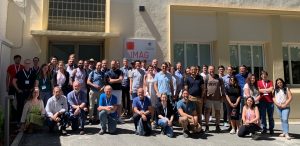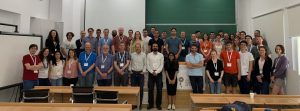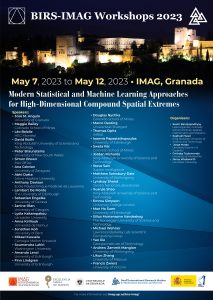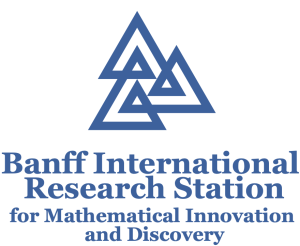Detalles de Evento
May 7-12, 2023
The Institute of Mathematics at the University of Granada will host the "Modern Statistical and Machine Learning Approaches for High-Dimensional Compound Spatial Extremes" workshop at the University of Granada (IMAG) in Spain, from May 7 - 12, 2023.
It is undisputed that the Earth is experiencing a period of changing climate, and due to climate change, it is expected that extreme events (e.g., heat waves, floods, storm surges, hurricanes, wildfires, earthquakes) may be more frequent, severe, and interdependent in the future, thus leading to larger impacts. An important step towards resilient extreme events monitoring and evaluating the hazards to infrastructure is to develop novel and rigorous mathematical and statistical framework that can identify areas vulnerable to compound extreme phenomena. In the current Big Data era, the difficulty of this task is often exacerbated with the data being increasingly massive and complex.
More information can be found on the BIRS website.
Online attendance
The talks of this workshop will be broadcast via Google Meet, and they can be followed at https://meet.google.com/czd-xfzh-ftx
Schedule
Further details, including abtracts of the talks, can be found on the BIRS website.
Organizers
- Soutir Bandyopadhyay (Colorado School of Mines)
- Raphael Huser (King Abdullah University of Science and Technology)
- Jorge Mateu (Universitat Jaume I)
- Gwladys Toulemonde (University of Montpellier)
- Jenny Wadsworth (Lancaster University)
Confirmed Participants
- Jose M. Angulo (University of Granada)
- Maggie Bailey (Colorado School of Mines)
- Léo Belzile (HEC Monréal)
- David Bolin (King Abdullah University of Science and Technology)
- Peter Braunsteins (University of New South Wales)
- Simon Brown (Met Office)
- Ana Cebrian (University of Zaragoza)
- Abhi Datta (Johns Hopkins University)
- Anthony Davison (Ecole Polytechnique Fédérale de Lausanne)
- Lambert De Monte (The University of Edinburgh)
- Sebastian Engelke (University of Geneva)
- Janine Illian (University of Glasgow)
- Lydia Kakampakou (Lancaster University)
- Anna Kiriliouk (Université de Namur)
- Jonathan Koh (University of Bern)
- Mikael Kuusela (Carnegie Mellon University)
- Soumendra Lahiri (Washington University)
- Amanda Lenzi (University of Edinburgh)
- Finn Lindgren (University of Edinburgh)
- Douglas Nychka (Colorado School of Mines)
- Marco Oesting (Unuversitat Stuttgart)
- Thomas Opitz (INRAE)
- Ioannis Papastathopoulos (University of Edinburgh)
- Javier Platero (University Jaume I of Castellon)
- Sweta Rai (Colorado School of Mines)
- Jordan Richards (King Abdullah University of Science and Technology)
- Steve Sain (Jupiter Intelligence)
- Lyndsay Shand (Sandia National Laboratories)
- Xuanjie Shao (King Abdullah University of Science and Technology)
- Emma Simpson (University College London)
- Man Ho Suen (University of Edinburgh)
- Silius Mortensønn Vandeskog (The Norwegian University of Science and Technology)
- Michael Wehner (Lawrence Berkeley Lab-Scientific Computing Group)
- Yao Xie (Georgia Institute of Technology)
- Andrew Zammit Mangion (University of Wollongong)
- Likun Zhang (University of Missouri)
- Zhongwei Zhang (Université de Genève)
- Francis Zwiers (University of Victoria)






